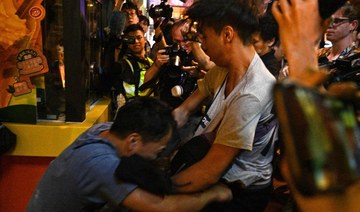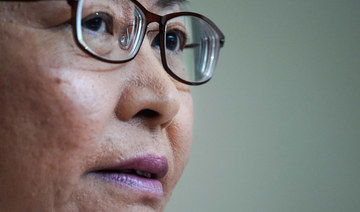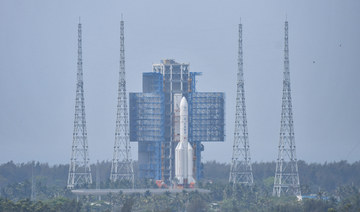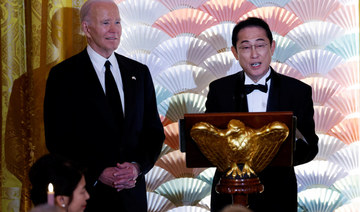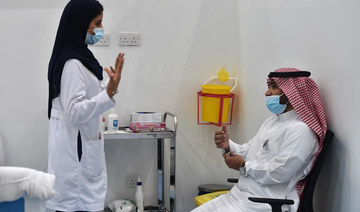HONG KONG: Groups of China supporters pulled down “Lennon Walls” of anti-government protest messages across Hong Kong on Saturday, raising the possibility of clashes with democracy supporters and another weekend of trouble.
By mid-morning, dozens of Beijing supporters had started to tear down the large mosaics of colorful posted notes calling for democracy and denouncing perceived Chinese meddling in the former British colony.
The installations have blossomed across the Asian financial center, at bus stops and shopping centers, under footbridges and along pedestrian walkways.
They have also occasionally become hot spots of violence in the city’s three months of unrest.
Hong Kong’s protests picked up in June over legislation, now withdrawn, that would have allowed people to be sent to mainland China for trial. Demands have since broadened into calls for universal suffrage.
A pro-Beijing city legislator, Junius Ho, who has been a vocal critic of the protests, had urged his supporters to clean up the approximately 100 Lennon Walls around the city on Saturday.
The walls are named after the John Lennon Wall in communist-controlled Prague in the 1980s that was covered with Beatles lyrics and messages of political grievance.
However, in a message posted late on Friday his Facebook page on Friday, Ho said “for the sake of safety” the Lennon Walls would not be cleared up, only the streets.
“We will clean up the environment with a peaceful and rational attitude,” he said.
The anti-government protesters are angry about what they see as creeping interference by Beijing on Hong Kong’s “one country, two systems” formula that ensures freedoms not enjoyed on the mainland, including the right of assembly and an independent judiciary.
China says it is committed to the “one country, two systems” arrangement and denies interfering. It has accused foreign governments including the United States and Britain, of inciting the unrest.
The demonstrations have taken on their own rhythm over the months and now tend to peak on the weekends, often with anti-government activists, many masked and in black, throwing petrol bombs at police, trashing metro stations, blocking airport roads and lighting street fires.
At times, they have been confronted by supporters of Beijing wielding sticks.
More pro-democracy protests are planned this weekend including a sit in the Yuen Long suburban subway station, marking two months since activists were attacked by a mob there.
The city’s transit operator, MTR Corp, said it would close train stations near potential protest sites, including Yuen Long and Tuen Mun, for safety reasons starting from early afternoon.
Protesters had said on Friday that while they did not want violence, they would defend themselves if they were attacked.
Pro-Beijing groups tear down Hong Kong’s protest walls, raising risk of clashes
Pro-Beijing groups tear down Hong Kong’s protest walls, raising risk of clashes

- The installations have blossomed across the Asian financial center
- Pro-Beijing city legislator Junius Ho had urged his supporters to clean up the approximately 100 Lennon Walls
A Chinese spacecraft lands on moon’s far side to collect rocks in growing space rivalry with US

- China National Space Administration said the landing module touched down in a huge crater known as the South Pole-Aitken Basin
- The mission is the sixth in the Chang’e moon exploration program, which is named after a Chinese moon goddess
BEIJING: A Chinese spacecraft landed on the far side of the moon Sunday to collect soil and rock samples that could provide insights into differences between the less-explored region and the better-known near side.
The landing module touched down at 6:23 a.m. Beijing time in a huge crater known as the South Pole-Aitken Basin, the China National Space Administration said.
The mission is the sixth in the Chang’e moon exploration program, which is named after a Chinese moon goddess. It is the second designed to bring back samples, following the Chang’e 5, which did so from the near side in 2020.
The moon program is part of a growing rivalry with the US — still the leader in space exploration — and others, including Japan and India. China has put its own space station in orbit and regularly sends crews there.
The emerging global power aims to put a person on the moon before 2030, which would make it the second nation after the United States to do so. America is planning to land astronauts on the moon again — for the first time in more than 50 years — though NASA pushed the target date back to 2026 earlier this year.
US efforts to use private sector rockets to launch spacecraft have been repeatedly delayed. Last-minute computer trouble nixed the planned launch of Boeing’s first astronaut flight Saturday.
Earlier Saturday, a Japanese billionaire called off his plan to orbit the moon because of uncertainty over the development of a mega rocket by SpaceX. NASA is planning to use the rocket to send its astronauts to the moon.
In China’s current mission, the lander is to use a mechanical arm and a drill to gather up to 2 kilograms (4.4 pounds) of surface and underground material for about two days.
An ascender atop the lander will then take the samples in a metal vacuum container back to another module that is orbiting the moon. The container will be transferred to a re-entry capsule that is due to return to Earth in the deserts of China’s Inner Mongolia region about June 25.
Missions to the moon’s far side are more difficult because it doesn’t face the Earth, requiring a relay satellite to maintain communications. The terrain is also more rugged, with fewer flat areas to land.
Zelensky meets heads of state in Singapore, seeks support for security summit

- Russia has not attended the security summit in Singapore since it invaded Ukraine in 2022
Ukrainian President Volodomyr Zelensky met with heads of state and legislators in Singapore late on Saturday and early on Sunday, seeking security assistance and support for a peace summit after arriving for a surprise visit to the Shangri-La Dialogue.
On the social media platform X, Zelensky said he had met with Indonesia’s president-elect, Prabowo Subianto; a delegation from the US Congress; and the president of Timor-Leste, Jose Ramos-Horta.
“It is very important for us to begin the process of establishing a just peace,” Zelensky said. “Russia does not want to end the war. Therefore, we must work together with the entire world to bring peace closer.”
He said Ramos-Horta had agreed to attend the summit, scheduled for mid-June in Switzerland. At last year’s Shangri-La Dialogue, Prabowo had proposed an Indonesian plan for ending the war in Ukraine.
Russia has not attended the security summit in Singapore since it invaded Ukraine in 2022.
Zelensky and his defense minister, Rustem Umerov, will also meet with US Defense Secretary Lloyd Austin on Sunday on the sidelines of the conference, a US defense official said, speaking on condition of anonymity because of the sensitivity of the issue.
They will discuss the current battlefield situation in Ukraine and Austin will “underscore US commitment to ensuring Ukraine has what it needs to defend itself against ongoing Russian aggression,” the official said.
Zelensky is also scheduled to speak at the security summit’s final discussion session on Sunday on “Re-Imagining Solutions for Global Peace and Regional Stability.”
Ukraine is facing a renewed assault from Russian forces, particularly around the northeastern city of Kharkiv. The United States recently relaxed restrictions on the use of US-supplied weapons to strike targets in Russia, which experts say will help Ukraine blunt attacks before they gather momentum.
The Shangri-La Dialogue, organized by the London-based International Institute of Strategic Studies, ends on Sunday.
Disruptions at University of Chicago graduation as school withholds 4 diplomas over Gaza war protests

- Amid calls to “Stop Genocide" in Gaza, a crowd of students carrying Palestinian flags walked out between speeches, and a demonstration followed the official ceremony
- Students have walked out of commencements at Harvard University, the Massachusetts Institute of Technology and others as protest camps have sprung up across the US and in Europe
CHICAGO: Dozens of students protesting the war in Gaza walked out of the University of Chicago’s commencement Saturday as the school withheld the diplomas of four seniors over their involvement with a pro-Palestinian encampment.
The disruption to the rainy two-hour outdoor ceremony was brief, with shouts, boos and calls to “Stop Genocide.” A crowd of students walked out between speeches, and a demonstration followed the official ceremony. Some chanted as they held Palestinian flags, while others donned traditional kaffiyeh, black and white checkered scarves that represent Palestinian solidarity, over their robes.
Four graduating seniors, including Youssef Haweh, were informed by email in recent days that their degrees would be withheld pending a disciplinary process related to complaints about the encampment, according to student group UChicago United for Palestine.
“My diploma doesn’t matter when there are people in Palestine and in Gaza that will never walk a stage again, who will never receive a diploma. What about them? Who’s going to fight for them?” Haweh said in a Saturday statement.
University officials acknowledged the walkout, saying the school is “committed to upholding the rights of students to express a wide range of views,” according to a statement.
Students have walked out of commencements at Harvard University, the Massachusetts Institute of Technology and others as protest camps have sprung up across the US and in Europe in recent weeks. Students have demanded their universities stop doing business with Israel or companies they say support its war in Gaza. Organizers seek to amplify calls to end Israel’s war with Hamas, which they describe as a genocide against the Palestinians.
A small demonstration after the commencement, where protesters tried to access a closed street, resulted in the arrest of one person not affiliated with the school, university officials said in a statement.
The University of Chicago encampment was cleared May 7. Administrators had initially adopted a permissive approach, but later said the protest had crossed a line and caused growing concerns about safety. One group temporarily took over a building on the school’s campus.
University officials have said the demonstrations prompted formal complaints including for “disruptive conduct,” and would require further review. The students were still able to participate in graduation, and can receive their degrees if they are later cleared after the university inquiry into alleged violations of campus policy. The university didn’t have comment Saturday about the diplomas.
Thousands of students and faculty members have signed a petition calling for the university to grant the degrees, while more than a dozen Chicago City Council members have penned a letter asking for the same.
WHO member countries approve steps to bolster health regulations to better brace for pandemics

- Amendments to global health regulations include helping developing countries gain better access to financing and medical products to fight pandemics
- Talks aimed at reaching a global agreement on how to better fight pandemics will be concluded by 2025
GENEVA: The World Health Organization says member countries on Saturday approved a series of new steps to improve global preparedness for and response to pandemics like COVID-19 and mpox.
The WHO’s 194 member states have been negotiating for two years on an agreement that could increase collaboration before and during pandemics after the acknowledged failures during COVID-19.
Countries agreed to amend the International Health Regulations, which were adopted in 2005, such as by defining a “pandemic emergency” and helping developing countries gain better access to financing and medical products, WHO said.
The agreement came as the UN agency wrapped up its six-day World Health Assembly this year, after plans to adopt a more sweeping pandemic “treaty” at the meeting was shelved largely over disagreements between developing countries and richer ones about better sharing of technology and the pathogens that trigger outbreaks.
But the groups agreed to complete negotiations on the pandemic accord next year or earlier if possible, the WHO said.
“The historic decisions taken today demonstrate a common desire by member states to protect their own people, and the world’s, from the shared risk of public health emergencies and future pandemics,” WHO Director-General Tedros Adhanom Ghebreyesus said in a statement.
“With this agreement, we take steps to hold countries accountable and strengthen measures to stop outbreaks before they threaten Americans and our security,” said US Health and Human Services Secretary Xavier Becerra on Saturday.
The changes to the global health rules were aimed at shoring up the world’s defenses against new pathogens after COVID-19 killed more than 7 million people, according to WHO data.
Lawrence Gostin, a public health law expert at Georgetown University, hailed a “big win for health security,” and posted on X that the move “will simplify negotiations for the pandemic agreement.”
WHO said countries have defined a pandemic emergency as a communicable disease that has a “wide geographical spread” or a high risk of one, and has exceeded or can exceed the ability of national health systems to respond.
It’s also defined as an outbreak that has or could cause “substantial” economic or social disruption and requires quick international action, the agency said.
Yuanqiong Hu, a senior legal and policy adviser at Doctors without Borders, said that the changes adopted Saturday include “important provisions addressing equity in access to health products during global health emergencies.”
WHO extends anti-pandemic treaty talks

- WHO agreed in 2021 as the COVID-19 pandemic eased to launch talks on an accord to counter any new global health crisis
GENEVA: The World Health Organization annual assembly on Saturday gave member countries another year to agree on a landmark accord to combat future pandemics.
Three years of efforts to reach a deal ended last month in failure. But WHO chief Tedros Adhanom Ghebreyesus hailed what he called “historic” decisions taken to make a new bid for an accord.
The WHO agreed in 2021 as the COVID-19 pandemic eased to launch talks on an accord to counter any new global health crisis. Millions died from Covid-19 which brought health systems in many countries to their knees.
Talks hit multiple obstacles however with many developing countries angry that rich nations monopolized available Covid-19 vaccines.
They have sought assurances that any new accord will make provision of medicines and the sharing of research more equitable.
The WHO annual assembly “made concrete commitments to completing negotiations on a global pandemic agreement within a year, at the latest,” said a statement released at the end of the Geneva meeting.
The assembly also agreed amendments to an international framework of binding health rules to introduce the notion of a “pandemic emergency” which calls on member states to take “rapid” coordinated action, said the statement.
“The historic decisions taken today demonstrate a common desire by member states to protect their own people, and the world’s, from the shared risk of public health emergencies and future pandemics,” said Tedros.
He said the change to health rules “will bolster countries’ ability to detect and respond to future outbreaks and pandemics by strengthening their own national capacities, and coordination between fellow states, on disease surveillance, information sharing and response.”
Tedros added: “The decision to conclude the pandemic agreement within the next year demonstrates how strongly and urgently countries want it, because the next pandemic is a matter of when, not if.”



